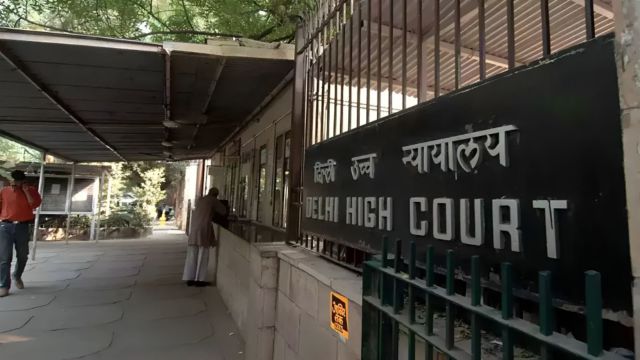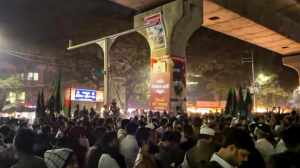Only 26 convicts with appeals pending in SC granted furlough in 10 years, Delhi govt tells HC
The government has provided the data to HC in response to appeals by Hashimpura massacre convicts challenging a furlough rule of Delhi prisons
 The data has been provided by the Delhi prison administration after a court order sought the details in a bunch of petitions by 12 convicts of the Hashimpura massacre
The data has been provided by the Delhi prison administration after a court order sought the details in a bunch of petitions by 12 convicts of the Hashimpura massacreIn the last 10 years, only 26 convicts whose appeals are pending in the Supreme Court, and are lodged in various Delhi jails, have been granted furlough or a temporary release, the Delhi government has informed the High Court. As of January, 68 convicts have their appeals against their conviction pending before the Supreme Court. Data accessed by The Indian Express shows that one of these appeals dates as far back as 2012 and four other appeals have been pending since 2014.
The 26 convicts who could be out on furlough were able to secure a temporary release until a single-judge bench of the High Court in order dated July 3, 2023, held that if a convict’s appeal is pending in the Supreme Court, only the apex court can direct the grant of furlough, and not the High Court.
The data has been provided by the Delhi prison administration after a court order sought the details in a bunch of petitions by 12 convicts of the Hashimpura massacre. The convicts have challenged the constitutional validity of a prison rule that requires court-ordered furlough instead of executive granting furlough if a convict’s appeal is pending.
In 2018, a division bench of Delhi HC headed by Justice S Muralidhar reversed the 2015 acquittal of 16 former members of the Uttar Pradesh Provincial Armed Constabulary (PAC) and held them guilty of murder, criminal conspiracy, kidnapping, and causing disappearance of evidence. The convicts were sentenced to life imprisonment.
During the 1987 Hashimpura massacre in UP’s Meerut, the accused, who were posted for riot control following communal riots, had rounded up around 42-45 Muslim men and taken them away in a truck. They were later shot and the bodies were dumped in the Gang Nahar and Hindon canal. Of the 38 who were killed, the bodies of only 11 were identified by families. The remaining bodies were not recovered.
A division bench of the Delhi HC is now examining whether an application seeking furlough would be maintainable before the High Court during the pendency of an appeal against conviction before the SC, or would the convict have to approach the Supreme Court for relief. The division bench is also testing the constitutional validity of the said prison rule which 12 co-convicts in the Hashimpura massacre case are challenging.
One of the convicts, Budhi Singh, in March 2022 had challenged an order of the jail authorities by which they had declined to grant him furlough.
The court is specifically examining Note 2 to Rule 1224 of the Delhi Prison Rules, 2018, which reads: “If an appeal of a convict is pending before the High Court or the period for filing an appeal before the High Court has not expired, furlough will not be granted and it would be open to the convict to seek appropriate directions from the Court.”
In an affidavit filed on behalf of the prison administration before the HC on January 22, it has been submitted that the note was included “consciously by the Government of NCT of Delhi taking away the jurisdiction vested in the executive to consider an application for furlough” and that a similar restriction has also been imposed on the release of the prisoners on parole. The rationale, as per the authorities, stems from the Parole/Furlough Guidelines, 2010, which was approved by the then L-G in an order on February 17, 2010.
On December 2, 2022, the Delhi HC framed seven issues for adjudication and interpretation of the said rule. A single-judge bench of Delhi HC of Justice Amit Mahajan, in an order in July 2023, had held that the ‘high court’ in the above provision is meant to imply appellate court, which would then include Delhi High Court as well as the Supreme Court. Justice Mahajan had also held that if an appeal of a convict is pending before the SC, the Delhi HC cannot grant furlough even by exercising its extraordinary powers under Article 226.
Four of the seven issues involved dealt with the constitutional validity of the rule, which is now being adjudicated by the division bench.
These include whether the rule is in violation of Articles 14 and 21 of the Constitution of India; whether denial of furlough, on account of the pendency of an appeal in the Supreme Court of India, despite good conduct earned by the convict, would run contrary to the theory of reformative approach; and whether the jurisprudence on parole can be applied to furlough since furlough does not involve suspension of sentence.
On January 8, a division bench of Justices Prathiba Singh and Amit Sharma had directed the Director General (Prisons), Delhi, to file an affidavit giving details of the number of cases in which the prison authorities concerned have granted furlough in the last 10 years with respect of convicts whose criminal appeals/ special leave petitions are pending or were pending before the Supreme Court as of July 2023. The court also sought details of the number of convicts in the respective prisons in Delhi, whose criminal appeals or special leave petitions are pending before the Supreme Court.
On Tuesday, advocate Sarthak Maggon, appearing for one of the convicts before the division bench, highlighted that the rule has a differential impact, where convicts whose appeals are pending before higher courts are effectively penalised compared to those whose appeals have been dismissed. Maggon also argued that such a rule may discourage a convict from filing an appeal and “may cause a chilling effect”, adding that standards for furlough are distinguishable and distinct.
The state is due to argue the matter further on April 25.
Making submissions on the constitutional validity of the rule before the bench on January 23, amicus curiae in the case, senior advocate Vivek Sood, impressed that the “matter of furlough should be left to the executive wisdom” and that such a limitation for convict-prisoners as imposed in the note 2 of the rule “is liable to struck down”.
“For (executive grant of) furlough, no lawyers are required, no grounds have to be given and (furlough) is granted in a time bound manner. Whereas, if the prisoner is to file an application (before an appellate court seeking furlough as Note 2 of the rule 1224 provides), it becomes a legal process, lawyers get involved, costly process, time consuming also,” Sood had argued in January.







